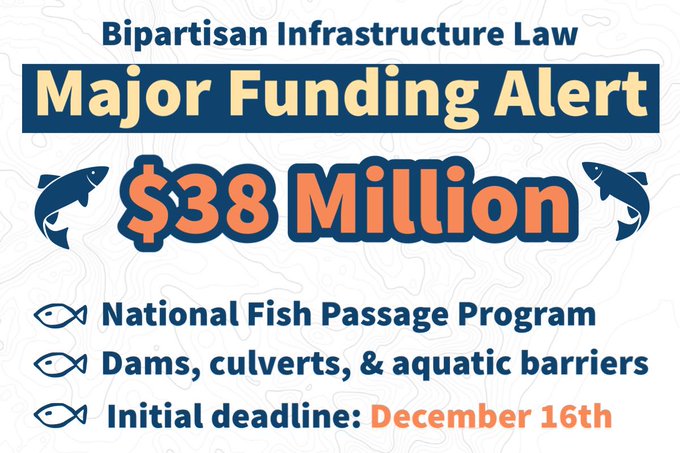
Projects will be part of a five-year, $200 million Bipartisan Infrastructure Law investment to restore aquatic ecosystems
November 20, 2022 - WASHINGTON - The U.S. Fish and Wildlife Service is announcing the availability of $38 million in funding from President Biden’s Bipartisan Infrastructure Law for fish passage projects across the nation that address outdated, unsafe or obsolete dams, culverts, levees and other barriers fragmenting our nation’s rivers and streams. In 2022, the Service’s National Fish Passage Program provided an initial $38 million Bipartisan Infrastructure Law investment to fund 40 projects in 23 states and Puerto Rico, which brought big wins for fish passage and local communities. These funds build on the nearly $2 billion in funding for fish passage projects under the Bipartisan Infrastructure Law across the Departments of the Interior, Transportation, Agriculture, and Commerce.
The program — in partnership with complementary programs at the Federal Highway Administration and NOAA Fisheries — is now looking to identify projects and partners for the next round of funding.
“From Alaska to Maine, jackhammers and backhoes are removing dams and replacing culverts to restore free-flowing rivers, reduce flood risks and address threats from climate change ,” said Service Director Martha Williams. “With $38 million in additional Bipartisan Infrastructure Law funding for fish passage projects, the Service will continue our momentum by collaborating with Tribes, state and local agencies, non-governmental organizations and conservation partners to reconnect aquatic systems, improve fish migration, and restore aquatic infrastructure resilience in these fragile habitats.”
The National Fish Passage Program prioritizes projects that will:
- maximize benefits to priority species and habitats;
- provide sustainable fish passage;
- leverage regional or watershed priorities for habitat restoration, fish passage, or aquatic connectivity;
- enhance community resilience to climate change, address public safety hazards and provide other benefits such as job creation or recreational fishing opportunities;
- support or engage with underserved and indigenous communities; and
- be supported by partners, affected stakeholders, and the local community
Interested parties should submit a Letter of Intent to the appropriate National Fish Passage Program regional coordinator, via email, by December 16, 2022. Letters of Intent should include basic project information and a statement of interest. More information, including a list of National Fish Passage regional coordinators, may be found at Grants.Gov or by visiting the program’s informational website.
The National Fish Passage Program, facilitated by the Service’s Fish and Aquatic Conservation Program, has decades of proven experience implementing infrastructure projects with partners to improve the health of the nation’s waterways, reconnect rivers, improve climate resilience and enhance local economies. The program provides financial, technical and planning assistance to Tribes, communities, other agencies and landowners to help remove barriers and restore rivers for the benefit of fish and people.
Since 1999, the program has worked with over 2,000 local communities, states, Tribes and private landowners to remove or bypass 3,400 barriers to fish passage and has reopened access to over 60,000 miles of upstream habitat for fish and other animals.
The U.S. Fish and Wildlife Service works with others to conserve, protect, and enhance fish, wildlife, plants, and their habitats for the continuing benefit of the American people. For more information, visit www.fws.gov, or connect with us through any of these social media channels: Facebook, Instagram, Twitter, Flickr, and YouTube.
Source: USFWS








